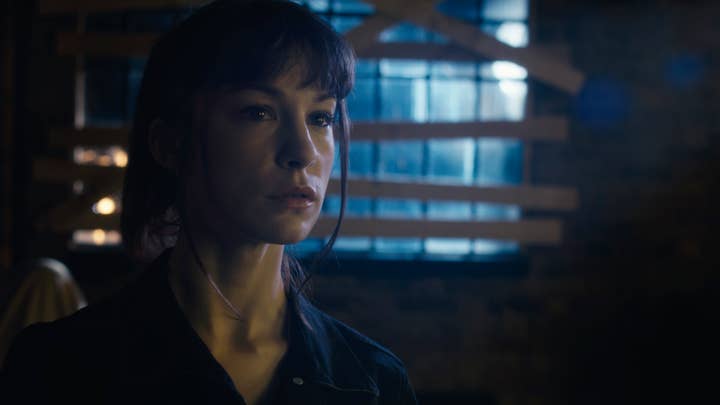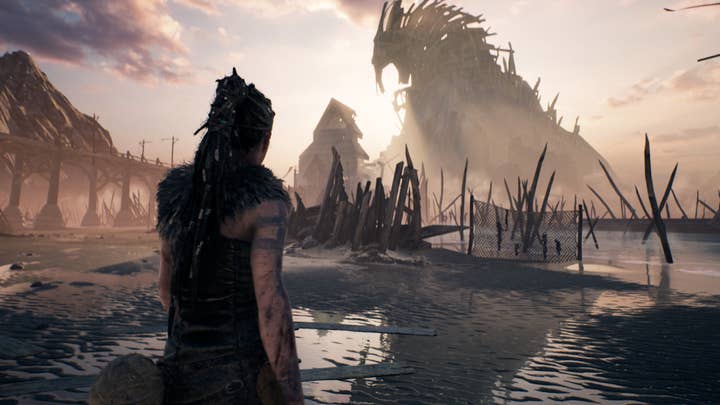"Smaller studios will define the future of video game storytelling"
A fresh wave of developers aims to change the industry with narrative titles that appeal to wider audiences than anything in the charts
The video games industry has made significant advances in almost every aspect of development: visual quality, audio, art and design. But there is one area in which progress has been considerably slower - storytelling.
A casual glance at the charts show the majority of the top 10 best-selling games are primarily built around mechanics more than anything else - FIFA, Gran Turismo, Mario Odyssey, and so on - and perhaps this is as it should be. Games are, after all, a medium centred on interactivity rather than passive consumption, but it can also be argued there's no reason why the narrative context of players' actions shouldn't be just as interactive.

There has been speculation over the past few months about the 'death of the single-player adventure' in the wake of Visceral's shock closure, while others point to Telltale's layoffs as signs that story-driven titles are not worth the investment.
But Martin Alltimes - founder of The Imaginati and one of the lead developers behind Planet of the Apes: Last Frontier - is confident plenty of studios are already servicing any demand these two were catering to... just not the ones you might think.
"The AAA space has collapsed into a limited set of games with very similar features - whereas indie games are pushing the boundaries of storytelling and in the process redefining what a game is," he tells GamesIndustry.biz. "So while they don't currently enjoy the level of success of their AAA counterparts, they are having much more of an impact on the long-term direction of gaming."
Jack Attridge, founder of FlavourWorks and creative director of PlayStation-exclusive Erica, agrees: "Independent studios may not be able to offer the scope and polish of a project by a team with 300 people and a five-year dev cycle, but they can be more agile, and offer something more focused and personal."
"While indies don't currently enjoy the level of success of their AAA counterparts, they are having much more of an impact on the long-term direction of gaming"
Martin Alltimes, The Imaginati
When we last spoke to Alltimes, he told us how his narrative Planet of the Apes adventure had been designed with partners and parents in mind, rather than just the traditional gamer. Similarly, Attridge's Erica is best described as an interactive movie for PlayLink - although this doesn't quite encapsulate the scope of the project - that he hopes will reach a far broader audience.
Last month, ex-Quantic Dream lead Caroline Marchal opened Interior Night, a new studio in London working on "innovative and accessible narrative games" for "people who love shows like Breaking Bad or Fargo but who do not necessarily game". These are just three of the rising number of studios that believe storytelling is the key to expanding the audience for video games in the home.
"Narrative games are generally focussed on story and less on skills, which creates a lower barrier of entry for players," says Marchal. "Some great indie and not so indie games - from Life is Strange to Heavy Rain and Gone Home - have led the way and proven you can reach different audiences."

Attridge adds: "We wanted to bring new people into the medium without alienating existing gamers. This, I think, is due to a mix of the maturing tastes of developers, as well as a growing appetite for stories from players. It's heart-breaking to love an art form that you cannot share with friends and families who find the barrier to entry with traditional games too high. It seems like a win-win to offer something new and meaningful to existing gamers whilst also reaching a whole bunch of new gamers through accessible design and resonant storytelling.

"Stories are emotionally engaging and rewarding in a way that is more complex than reaching a high score or avoiding a game over, and exploring those feelings becomes far more interesting through the lens of an interactive experience. As we explore that further, we can break out of this bubble where we are only designing for a selective audience, and in the long run will be able to celebrate games within a broader cultural relevance."
However, Marchal warns that reaching this broader audience is a "double challenge".
"Firstly, you have to get noticed by non gamers - we count on the gamers in the household to evangelize in our favour, but we are also looking at alternative distribution methods," she says. "And secondly, once they know about your game and want to play it, you have to make sure they won't be discouraged by too complicated controls. If you manage to offer great story with accessible but deep gameplay, that's a win. It sounds simple, but it's actually really difficult to pull off."
"If you manage to offer great story with accessible but deep gameplay, that's a win. It sounds simple, but it's actually really difficult to pull off"
Caroline Marchal, Interior Night
A further challenge, Attridge observes, is the need for high-quality writing. This craft is "incredibly difficult" which makes it hard to find the right talent for your project, and perhaps explains why storytelling has advanced so much slower than graphical capabilities, for example.
"Even now, many of the greatest examples of storytelling in games are somewhat using linear storytelling within cutscenes or scripted sequences, but writing a rewarding branching or non-linear narrative for instance is still something that is rarely cracked," says Attridge. "So it's risky building a game around a central skillset that hasn't had a great history in the industry."
This makes it difficult to get a narrative-centric project off the ground, particularly in the AAA space, but fortunately the Erica director says attitudes towards such titles are changing - hence his studio's exclusive partnership with PlayStation.
"When we were starting Flavourworks three years ago, we built a prototype which we showed around the industry to prove that we had a winning formula, and the reaction we generally got was, 'You convinced us. This works. There is a future for this'," he says. "Before that there was a wariness. Now you see a growing belief in the viability of this area."

Alltimes observes that while focusing more on narrative and less on complicated mechanics should bring in that broader audience, there is plenty of demand for more satisfying stories among established gamers.
"It's heart-breaking to love an art form that you cannot share with friends and families who find the barrier to entry with traditional games too high"
Jack Attridge, FlavourWorks
"My take on this is very simple, but not unique: I love console games but simply don't have the time to play massive AAA games anymore," he says. "So it felt completely natural to design a narrative experience that I could play in just a few hours."
As the gamers who fuelled the previous console generations with their abundant spare time and disposable income find themselves able to dedicate less to every new release, Alltimes is unquestionably not alone in his changing tastes.
There is perhaps the perception that shorter, narrative-focused games developed by smaller teams are automatically of a lesser quality than the epic blockbusters put together by the world's biggest studios - but Ninja Theory has gone some way to disproving this with Hellblade, released earlier this year.
Mechanically similar to full-price action-adventure games, it weaves a tale of trauma and personal exploration that few AAA titles would dare to embark upon, and certainly hasn't suffered for it. Commercial director Dominic Matthews stresses that not all games suit the AAA structure.

"Games are criticised for being short, but you look at games like Journey or Inside, they are short but for my mind close to perfection," he says. "You wouldn't want that game to be longer or open world or any of those things.
"There's such a high expectation on games to be massive because they are all competing against each other to have the biggest map and it's got to be 40 hours long."
Marchal adds: "Dontnod, Telltale, Campo Santo and Fullbright have already proven that you can do brilliant narrative games without typical AAA production values - and be very successful. What really matters is the story and the way players experience it via the gameplay. The AAA single-player action/adventure titles are a risky business as they cost a lot and need to sell a lot to become a success. That said, I doubt they will disappear as they are prestige titles for publishers - and for players."
While Alltimes acknowledges that publishers are increasingly willing to invest in interactive fiction, he remains skeptical that these will ever become a priority for such firms.
"The challenge comes when they compare the ROI for a game in this genre relative to something more obviously commercial like a PVP shooter or a massive open-world game," he says. "Most of these guys are chasing the next billion-dollar franchise, so our games aren't big enough to move the needle."

Matthews argues that this could change as more publishers experiment with digital price points: "Take something like The Order 1886: narrative led, artistically incredible, but quite heavily criticised for the length of the game. But if you take that game and put it into the Hellblade model and charge $30, what would the critical reception have been?
"It's a strange thing in games, that length equates to price and value - which it doesn't in anything else, like books for films. It makes it very difficult to work out a price point. I did some work looking at how do people decide the value of the game, and I kind of came to the conclusion that it was perceived quality and length. Particularly in the digital space, it seems like people aren't willing to pay over a certain price point for something like a pixel art game."
Interior Night's Marchal circles back to her goal of appealing to the Breaking Bad and Fargo audiences. Television is enjoying a new golden age thanks to such shows drawing viewers in every week with compelling characters and their story arcs, and there's no reason why the games industry can't benefit from this.
"Narrative games are a super dynamic genre and having multiple studios trying different things is great," she says. "Very interesting experiments are also happening outside of the games industry - look at Netflix with their interactive programs or film companies having a go at virtual reality.
"I don't know what is going to come out of all these experiments and innovations in a few years - maybe a brand new medium - but we are super excited to be part of this and to have a chance to contribute."
